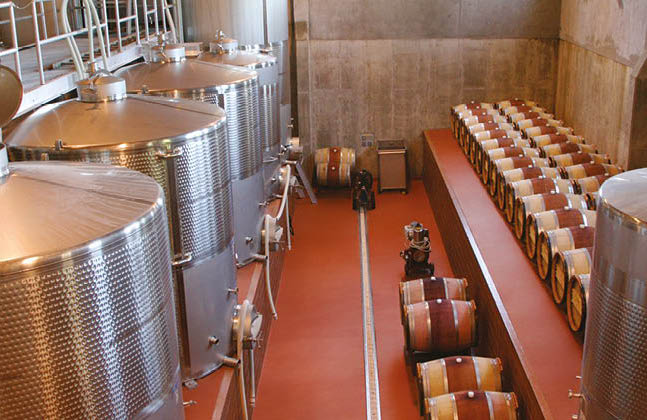Best Winery Floor Coating for Sydney and NSW


Winery Floors
Every building you have ever been to has been created from the ground up, and yet, winery floor coatings can easily become an after thought when you’re busy thinking about where you’re going to store all of your wine.
The thing is, winery floors demand a special type of floor coating if they are to keep the contents in peak condition – and with so many options to choose from, the decision isn’t always an easy one.
Ready to decide and get your project underway? Read on for details on some of the most popular floor coatings for winery floors – and when you’re ready, contact our team on 1800 587 172 for assistance with your installation project.
What makes a good floor coating for a winery?
A good floor in a winery is crucial for maintaining a safe and productive working environment. Here are some key factors to consider:
- Durability: The floor should be able to withstand heavy foot and vehicle traffic, as well as occasional spills and leaks.
- Easy to clean: A smooth, non-porous surface is essential for easy cleaning and sanitation. The floor should also be resistant to stains and chemical damage.
- Slip-resistant: The floor should provide good traction, even when wet, to prevent slips and falls.
- Hygienic: The floor should not harbour bacteria or other harmful microorganisms that can contaminate the wine or the winery environment.
- Temperature-resistant: The floor should be able to withstand temperature fluctuations without cracking or warping.
- Drainage: Proper drainage is essential for preventing water buildup and ensuring a dry, safe working environment. The floor should be sloped and designed to direct water towards drains.
- Aesthetics: While functionality is key, a good winery floor can also enhance the overall aesthetic appeal of the space. Consider materials and colours that complement the winery’s style and brand.
And the winner is! Polyurethane Cement
Here are some reasons why we recomend using polyurethane cement in your winery:
- Durability: Polyurethane cement is highly durable and can withstand heavy traffic, impacts, and scratches. This makes it ideal for wineries where there is a lot of foot traffic, forklifts, and machinery moving around.
- Chemical resistance: Wineries often use harsh chemicals and acids in their production processes, which can damage the flooring. Polyurethane cement is highly resistant to chemicals, acids, and solvents, making it an excellent choice for winery floors.
- Moisture resistance: Wineries are typically damp environments with high humidity levels. Polyurethane cement is moisture-resistant and can withstand exposure to water and damp conditions without deteriorating.
- Easy to clean and maintain: Polyurethane cement is easy to clean and maintain. It can be swept, mopped, and pressure washed without damaging the surface. This makes it easy to maintain a clean and hygienic environment in the winery.
- Safety: Wineries can be hazardous environments, with the potential for slips and falls. Polyurethane cement flooring can be installed with slip-resistant coatings to reduce the risk of accidents and injuries.
Overall, polyurethane cement is a highly durable, chemical-resistant, and easy-to-maintain flooring material that can help wineries maintain a clean, safe, and hygienic environment.
FAQ,s

What are the main challenges for winery floors in NSW and why is specialised coating important?
Winery floors must withstand heavy traffic, spills, leaks, chemicals, acids, moisture, humidity, and temperature fluctuations while preventing contamination to preserve wine quality. Specialised coatings ensure durability, hygiene, and safety, avoiding overlooked issues during planning. For more on food industry compliance, read our blog post on HACCP Compliant Flooring for Food Industries in NSW.
Why is polyurethane cement the recommended flooring for wineries?
Polyurethane cement excels in damp, high-humidity environments with its superior durability against impacts, scratches, and heavy machinery; chemical resistance to acids and solvents; moisture resistance; and easy maintenance for sweeping, mopping, or pressure washing. It also supports slip-resistant finishes for safety. For details on polyurethane cement, see our Polyurethane Cement Flooring page.
How does winery flooring ensure hygiene and proper drainage?
Ideal winery flooring is non-porous to resist stains, bacteria, and microorganisms, preventing contamination, while sloped designs direct water to drains to avoid buildup. This maintains a clean, hygienic space compliant with regulations. For a comparison with alternatives, read our blog post on Which is Better: Epoxy or Polyurethane Cement?.
What should I consider for aesthetics and safety in winery floor coatings?
Consider coatings that complement your winery’s style and brand with customisable colours and finishes, while prioritising slip-resistant textures for traction in wet conditions to reduce accidents. Polyurethane cement offers both functionality and visual appeal. For similar applications, check our Brewery Floors page.
How can I get started with winery floor installation in Sydney or the Central Coast?
Call us at 1800 587 172 for a 100% free, no-obligation consultation. We’ll discuss your needs, recommend polyurethane cement solutions, and provide a tailored quote, serving NSW areas today! Visit our Contact Us page for more details.
✅ Let's Talk — DiamondGrind
100% free consultation — no commitment required.
